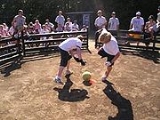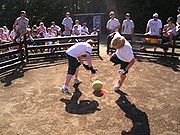
Ga-ga
Encyclopedia
Ga-ga is a form of dodgeball
Dodgeball
Dodgeball is any of a variety of games in which players try to hit other players on the opposing team with balls while avoiding being hit themselves. This article is about a well-known form of team sport with modified rules that is often played in physical education classes and has been featured...
.

Ga-ga can be played in any enclosed space. As the game progresses however, the ratio of open space to remaining players increases. To avoid lengthy matches, many players may sometimes form a human wall composed of eliminated players to decrease the size of the playing area. The human wall acts in just the same way a regular wall does, and can be moved at the judge's discretion. If the
walls are made of overturned tables and benches, usually they are moved instead.
To avoid the problem of players simply kneeling down and covering the exposed area below their knees with their hands, some variations require that a player cannot stay in the same position for any longer than three seconds. In some places, while kneeling a player can be hit anywhere and be eliminated.
Some versions require that only a player's hands and feet can touch the ground. This prevents players from falling to their knees as a defensive maneuver.
Some versions do not allow "blocking" with hands and arms.
Some house rule versions have a sudden death
Sudden death
In a sport or game, sudden death is a form of competition where play ends as soon as one competitor is ahead of the others, with that competitor becoming the winner. Sudden death is typically used as a tiebreaker when a contest is tied at the end of the normal playing time or the completion of...
rule for when the game gets down to two players where the players are allowed to hit the ball three times without it touching anything else, and the players are eliminated if the ball touches anywhere besides the hand. Also, several variations allow additional touches of the ball without hitting the wall or another player.
A variation of Ga-ga, called Gooey Ga-ga, involves playing the game in mud. (Players use a water hose to clean themselves after play.)
Another version involves sudden death and when an adult calls sudden death you can touch the ball as many times as you want.
Gameplay
Ga-ga is played in a large octagon or hexagon called the Ga-ga court. Ga-ga begins with someone throwing the gaga ball up into the air. When it bounces the players say "Ga" each bounce for the first three bounces. After three bounces the ball is in play and the game starts. A popular variation allows the game with only two bounces. The players say "Ga" on the first bounce, and the second bounce follows with the players saying "Ga-ga," beginning the game. If the ball is caught after a player pops it up (see rule 4 below) then this will repeat. Some variations do not allow catching the ball at all. Using the walls of the octagon to aid in jumping is legal as long as the player does not permanently sit on the ledge of the octagon. Sometimes, closed hand hits may be banned. When there is a strong enough pit, some places may allow eliminated players to sit on the wall of the octagon.Rules
The rules of Ga-ga are as follows:- You can hit the ball with your hands, but picking up the ball and throwing it at a player is not allowed.
- If the ball touches a player anywhere on or below the waist (in some versions, below the knee), that player is eliminated from the game.
- A player cannot touch the ball two times sequentially, the ball must hit another player or wall before that player can touch the ball again. If the player violates this rule, it is called a double touch and that player is out. Some versions of the game allow double or even triple touches.
- If a player pops the ball up into the air, another player may catch it and ground it. Some variations do not allow catching at all.
- If a player hits the ball out of the court, and the ball doesn't hit anybody, then the player who hit it is out.
- The player cannot kick the ball. (As this is touching the ball below the waist.)
- If a player hits the ball out of the arena without touching the wall, ground, or other player's that player is out.
Adaptation for home play (Ga-ga)
Many places do not have a Ga-ga pit; an enclosed building or area (such as a play room or half basketball court) are used instead.A common variant for home play is Ga-ga; which entails the same rules as regular Ga-ga, but played in an open area instead of a pit. The rules are then changed to allow infinite hits without rebounds or limiting how many times one can hit the ball before making contact with an opponent.
Ga-ga (ball) is commonly played in an octagonal pit. Overturning tables or benches to their sides to make an octagon is a way to play it at home or in a community gym.
Representative injuries of Ga-ga
Ga-ga is an intense game that can be enjoyed by many age groups but can cause serious injury at the more competitive levels.Ga-ga knuckle
Ga-ga knuckle is a common injury associated with ga-ga. The injury is nicknamed as such because it results from the player's knuckles scraping against the playing surface in an attempt to hit the ball, and the most common symptom is bleeding knuckles. The injury commonly afflicts players who hit with a closed fist. In most circumstances the injury is treated with a quick trip to the camp nurse, who will have the player clean the wound with soap and water and cover it with a bandage. The injury is painful on turf or dirt surfaces, but can be especially severe if the surface is paved. The injury resulting from Ga-ga knuckle may take a week or more to heal. To prevent this specific injury a baseball batting glove is sometimes worn. Some players wear a sock on their hands to prevent injury.Head collisions
Players attempting to gain offensive control of the ball may collide headfirst while sprinting toward the ball, especially when the ball has stopped in a neutral area away from other players. Because players are looking downward toward the ball and are running with their heads in the lead position, this can lead to collisions and head injuries. It is also common for players to get hit in the face by the ball.Finger or Hand Fractures, Sprained finger
Players attempt to hit the ball using their fingers.Shoulder Injuries
Shoulder injuries include soreness and blunt trauma (falling on shoulder after tripping or running into a person or wall, if indoors) which may result in bone fractures.The most common shoulder injury is soreness. The sore feeling stems from powerful 'pendulum-style' hits from the shoulder through to the arm and then finally to the ball. Many hits like this and a person may develop a numb or sore feeling. This feeling may linger in the shoulder or upper arm for a day up to a few weeks. It is suggested to cease intense activity of the arm until it has fully healed. Limiting arm movement down to a bare minimum will help the tissues rebuild more quickly and result in a shorter recovery period whilst preventing more serious long-term complications.
Blunt Force Trauma is forceful, physical contact with another object that can be damaging. This type of trauma usually requires some form of cold/heat application followed by a doctor's examination to be safe. Contusions (Bruises) are the most common and least serious result from blunt trauma. They are the simplest to treat as well as to recover from. Fractures can result from intense collisions with other players, walls, the ground, etc. It is always safe to have first aid trained personnel on the grounds to provide initial medical support. If signs or symptoms appear indicative of a serious injury such as a open or closed fracture, call 911 immediately.
Introduction and Play Outside of Israel
Ga-ga was played amongst the Australian Jewish community of PerthPerth, Western Australia
Perth is the capital and largest city of the Australian state of Western Australia and the fourth most populous city in Australia. The Perth metropolitan area has an estimated population of almost 1,700,000....
, Western Australia
Western Australia
Western Australia is a state of Australia, occupying the entire western third of the Australian continent. It is bounded by the Indian Ocean to the north and west, the Great Australian Bight and Indian Ocean to the south, the Northern Territory to the north-east and South Australia to the south-east...
as early as the 1960s. The 1980s saw a thriving period for junior competition Ga-ga. The game was introduced here through the exchange of Israeli madrikhim (counselors) to Australia or Australian madrikhim returning from Israel. The game spread to the United States through Australian and/or Israeli madrikhim.
European Championships
The Ga-ga European Championship was first held in 2000 in LisbonLisbon
Lisbon is the capital city and largest city of Portugal with a population of 545,245 within its administrative limits on a land area of . The urban area of Lisbon extends beyond the administrative city limits with a population of 3 million on an area of , making it the 9th most populous urban...
, Portugal. Highly competitive, 36 countries participate every summer in game play. Noted winners include Gregory Scott Bradley (winner 2001, 2002, and 2004) of the United States, who defeated incumbent Swiss champion Scott Ritter (winner 2000), and Adam Miller (winner 2005, 2007, and 2008), representing Canada. Ga-ga game took momentum in the decade of '70s in Latin America, thanks to the tireless push of the Professor Ueve, founder of the Ani Be Ata institute.

